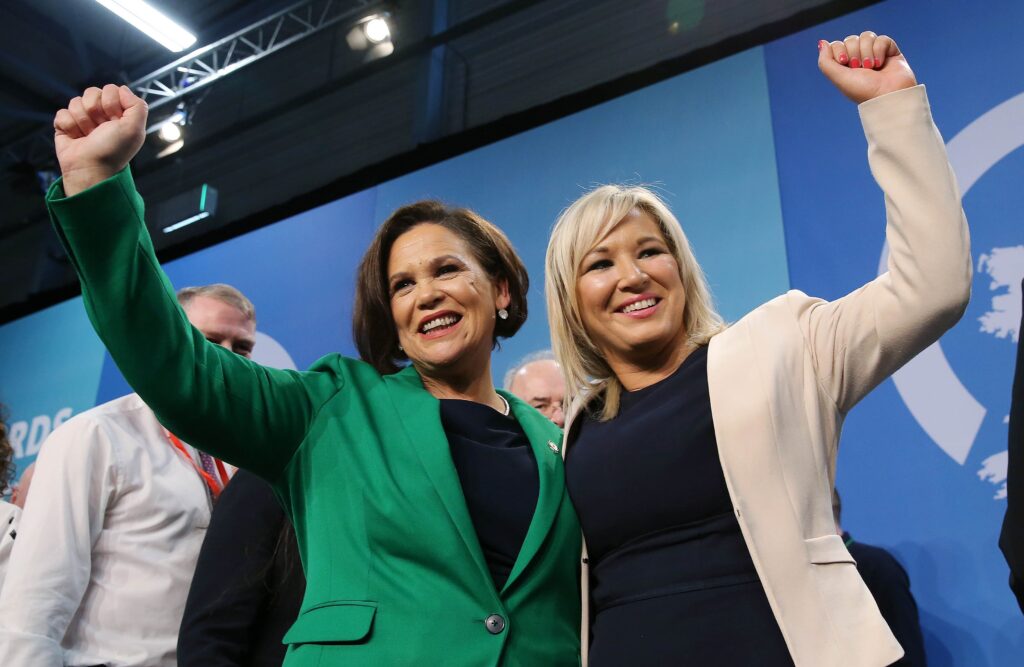If you wrote until recently that a unity referendum in Northern Ireland would most likely be rejected, the almost instant response from Sinn Féin commentators was that you were partitionist and negative about Irish unity. It was very easy to dismiss any expression of doubt as to the likelihood of their project for Irish unity succeeding in the short run.
Deep-seated intellectual confusion in our political discourse which has surrounded the issue of Irish unity is reflected in this paper’s poll data in relation to two very distinct questions. The first is whether people favour holding a border poll in the short, medium, or long term. Poll data suggests that northern voters are more likely to approve the holding of a referendum in the course of the next decade.
But the second question put to the same northern voter sample showed they are overwhelmingly likely to reject a proposal for Irish unity for the foreseeable future.
Large support for Irish unity among voters sampled in the Republic is based on a very different state of mind. People in the south would not want to be seen to reject any northern majority for unity, if such there was. Prevailing political ideology in the Republic is to favour and accommodate Irish unity if that is what a majority of voters in the north wish for.
There is no contradiction between the two polling outcomes which the Irish Times polls reveal. Nor is there anything illogical in southern voters expressing reluctance to jettison their constitution, institutions, flag or anthem while favouring Irish unity.
Of course, this poses the obvious question as to what is meant by Irish unity. Are we talking about a clean-slate, new unitary political and constitutional order? Or are we talking about a confederal arrangement between the two parts of Ireland? If we are not clear about that, we are debating an unknown abstraction.
Not merely is such a referendum scenario likely to suffer from all the problems we have seen with Brexit; people simply will not vote to end current constitutional arrangements without clear understanding of where that vote would leave them or lead them.
The strange irony is that Sinn Féin which beats the unity drum loudest has signally failed to spell out their preferred model of Irish unity. At one point they espoused a hare-brained scheme for four provincial parliaments, described as Éire Nua. We don’t hear anything about that these days. Instead, they now clamour for an all-Ireland socialist state – but won’t spell out exactly what that means. How socialist is “socialist”? Is it the Marxist revolutionary state proposed by James Connolly and favoured by a good number of the party’s leading ideologists? Or is it an alluring social democracy like that proposed by the Labour Party and the Social Democrats?
Instead of clarity, Sinn Féin calls for the establishment of a dialogue or citizen assembly type approach to the question of Irish unity. That saves them the political embarrassment of having to propose or campaign for a confederal or unitary state, and from defining what exactly they mean by a socialist republic.
The very least that they owe us is to spell out in detail their concept of a united Ireland so that voters – north and south – can, so to speak, kick the tyres of their proposal.
It is far easier to sell the illusion that Irish unity can mean anything at all – what you’re having yourself – and conceal the granular detail as to how their united Ireland would work in practice
But no majority – north or south – is going to vote for a political, economic, or social pig-in-the-poke. When, and if, a majority in the north wishes for Irish unity, any referendums – north or south – will have to be considered in concrete terms.
The Good Friday agreement was not based on any commitment to an early border poll. It wasn’t even based on having such a poll whenever a majority wanted one.
We signed up to a different bargain in 1989 which explicitly acknowledged that the then majority favoured the existing constitutional status of the north. We signed up to an arrangement that stated that while the majority remained of that view, Northern Ireland would be governed within the UK by a power-sharing executive in an assembly with checks and balances for political minorities and with north-south and east-west bodies.
Voters in the north still do not favour voting for Irish unity in a referendum – if this paper’s poll is accepted. That being so, Irish republicans like me must follow the “Shared Island” approach to creating political context for Irish unity.
Drum beating is both easy and dangerous – whether at Lambeg or Milltown cemetery. Reconciliation of Orange and Green is the true vocation of true republicans. Let’s put away the drumsticks.

